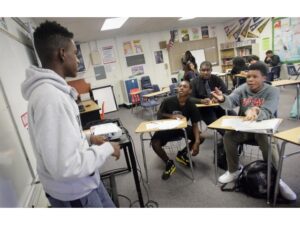September 15th is the International day of Democracy. The theme for this year is Democracy and the 2030 Agenda of Sustainable Development. Now it might seem a far fetched connection to education, but the children who are in school now will be the leaders in the 2030 vision. Why not then, inculcate a sense of democracy and leadership in them? Caroline Wanjiku has penned her thoughts concerning the topic of democracy in the school setting. Here is her say:
School councils are recently a common development, with most schools having representative bodies that include student leaders. Increasingly schools are looking to involve pupils effectively in important aspects of school life, hence a sense of democracy in the schools.
In this case, schools need to work upon the growing amount of experience by developing structures, providing for the effective involvement of pupils in democratic procedures. This will stimulate the sense responsibilities and leadership, in the pupils. It would also provide the pupils/ students with the real experience to influence and make decisions in matters which affect their lives inside and outside schools.
How students can participate in democratic processes in schools
- Making contributions to the day to day activities of the class and school
- Taking responsibility for their actions, by making rules together and supporting them
- Participating in decision-making processes of the school life, relating it with the democratic processes such as councils, parliaments, government and voting.
- Showing understanding of how changes are effected in the school and the society as a whole.
- Evaluating the effectiveness of different ways in which change can be brought and implemented at different stages in life.
- Participating effectively in school and community-based activities.
It may appear as though the sole purpose of introducing democracy in school, is for pupils/ students to express views, and their wishes to be implemented within the school setting. This has a far reaching effect though. We involve students in the democratic processes for a number of reasons which include:
When the norms and values of the school are formed by both the teachers and students, it makes for a more cooperative working atmosphere and harnesses the considerable weight of pupils’ opinion as opposed to authoritative guidance which only provokes rebellion among the students.
Students know much about the issues affecting them, more than teachers in some instances. Such areas where the students have expert knowledge include; student welfare issues, discipline issues, access to extra-curricular activities, their relations with each other.
Learning to speak out on issues of concern is an important educational experience, and helps build the confidence in the students, therefore building a sense of self awareness. Students should be allowed to articulate their issues thus developing their leadership skills from a young age.
Therefore it is vital that students are provided with structured opportunities to explore actively on aspects, issues and events through school and community involvement. Activities such as role play, case studies and critical discussions that are challenging and lives relevant to their and growth can be used to facilitate this process. Students should be given the opportunity to learn from their bad decisions and mistakes. “Failure is instructive. The person, who really thinks, learns quite as much from his failures as from his successes.” ― John Dewey . It is difficult to conceive of students as active citizens if their experience of learning in citizenship education has been predominantly passive.
Join us for our weekly EnezaChat on twitter today from 2.30-5 pm as we discuss the ways of involving our students in the democratic process.
About the author
Carolyne Wanjiku is our marketing intern. She holds a Bachelor of Education, and has a background in teaching Maths and Science to primary school Students.



